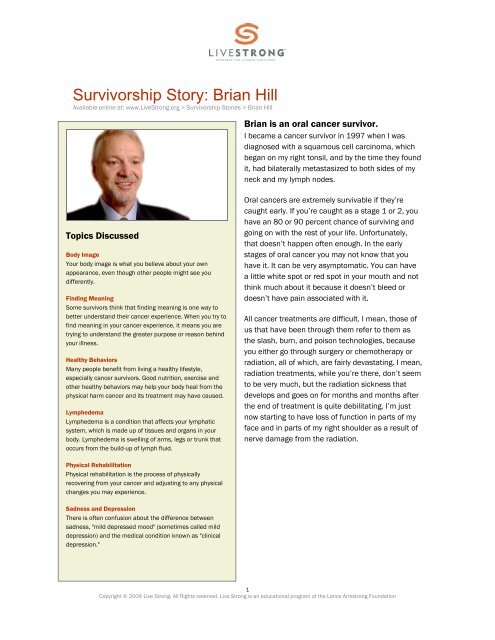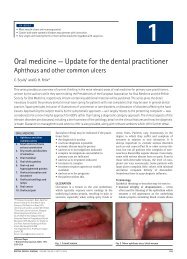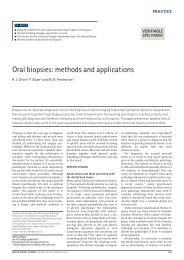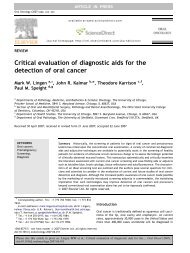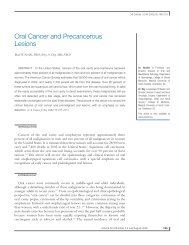Survivorship Story: Brian Hill - Oral Cancer Foundation
Survivorship Story: Brian Hill - Oral Cancer Foundation
Survivorship Story: Brian Hill - Oral Cancer Foundation
You also want an ePaper? Increase the reach of your titles
YUMPU automatically turns print PDFs into web optimized ePapers that Google loves.
<strong>Survivorship</strong> <strong>Story</strong>: <strong>Brian</strong> <strong>Hill</strong><br />
Available online at: www.LiveStrong.org > <strong>Survivorship</strong> Stories > <strong>Brian</strong> <strong>Hill</strong><br />
<strong>Brian</strong> is an oral cancer survivor.<br />
I became a cancer survivor in 1997 when I was<br />
diagnosed with a squamous cell carcinoma, which<br />
began on my right tonsil, and by the time they found<br />
it, had bilaterally metastasized to both sides of my<br />
neck and my lymph nodes.<br />
Topics Discussed<br />
Body Image<br />
Your body image is what you believe about your own<br />
appearance, even though other people might see you<br />
differently.<br />
Finding Meaning<br />
Some survivors think that finding meaning is one way to<br />
better understand their cancer experience. When you try to<br />
find meaning in your cancer experience, it means you are<br />
trying to understand the greater purpose or reason behind<br />
your illness.<br />
Healthy Behaviors<br />
Many people benefit from living a healthy lifestyle,<br />
especially cancer survivors. Good nutrition, exercise and<br />
other healthy behaviors may help your body heal from the<br />
physical harm cancer and its treatment may have caused.<br />
Lymphedema<br />
Lymphedema is a condition that affects your lymphatic<br />
system, which is made up of tissues and organs in your<br />
body. Lymphedema is swelling of arms, legs or trunk that<br />
occurs from the build-up of lymph fluid.<br />
<strong>Oral</strong> cancers are extremely survivable if they’re<br />
caught early. If you’re caught as a stage 1 or 2, you<br />
have an 80 or 90 percent chance of surviving and<br />
going on with the rest of your life. Unfortunately,<br />
that doesn’t happen often enough. In the early<br />
stages of oral cancer you may not know that you<br />
have it. It can be very asymptomatic. You can have<br />
a little white spot or red spot in your mouth and not<br />
think much about it because it doesn’t bleed or<br />
doesn’t have pain associated with it.<br />
All cancer treatments are difficult. I mean, those of<br />
us that have been through them refer to them as<br />
the slash, burn, and poison technologies, because<br />
you either go through surgery or chemotherapy or<br />
radiation, all of which, are fairly devastating. I mean,<br />
radiation treatments, while you’re there, don’t seem<br />
to be very much, but the radiation sickness that<br />
develops and goes on for months and months after<br />
the end of treatment is quite debilitating. I’m just<br />
now starting to have loss of function in parts of my<br />
face and in parts of my right shoulder as a result of<br />
nerve damage from the radiation.<br />
Physical Rehabilitation<br />
Physical rehabilitation is the process of physically<br />
recovering from your cancer and adjusting to any physical<br />
changes you may experience.<br />
Sadness and Depression<br />
There is often confusion about the difference between<br />
sadness, "mild depressed mood" (sometimes called mild<br />
depression) and the medical condition known as "clinical<br />
depression."<br />
1<br />
Copyright © 2004 Live Strong. All Rights reserved. Live Strong is an educational program of the Lance Armstrong <strong>Foundation</strong>
<strong>Brian</strong> <strong>Hill</strong> (continued)<br />
There are long-term effects of radiation. That’s a cumulative during your<br />
lifetime. About my third year out when I really felt that I was almost<br />
normal—as normal as cancer survivors feel, I developed the inability to<br />
control the corner of my mouth and I thought, “Wow, that’s really strange.<br />
What’s happening here” At first I was thinking I had a little stroke or<br />
something because the side of my face started drooping a little bit. Then I<br />
started having what they call fasciculations—my trapezoid just started<br />
going into contractions, I mean violently. My wife said on Star Trek there’s<br />
a species of aliens called the Cardassians, and they have these necks that<br />
look like lizards that kind of taper out with great big muscles, and my neck<br />
would just jump out, like a whole inch, and I had absolutely no control over<br />
it at all. When I went back to my doctors to ask about it, they said that<br />
about three to five percent of the people get nerve damage as a result of<br />
the radiation itself, and it takes a while to manifest itself. It may get worse;<br />
but it won’t get any better.<br />
As a by-product of having a radical neck vasection, all the lymph nodes on<br />
the right side of my neck, plus the fatty tissues that were here were<br />
removed. And, of course, this is a part of one of your body’s systems that<br />
is there to filter out things and it has a whole—I mean it’s connected<br />
throughout your whole body—to your upper chest, to your armpits, to your<br />
groin, and it’s a very sophisticated system. When you just take a chunk of<br />
it out at one time, all the fluids that are associated with that system that<br />
normally would come to that area still come, and as a result of that you<br />
develop edema in that area, a collection of fluids, in the area where those<br />
tissues were.<br />
It’s one of those body processes that just takes time for your body to work<br />
its way through. It does find new pathways and it does find ways around it,<br />
but during the period of time when you have it, it’s quite disconcerting to<br />
have, you know, a huge bulge in your body, for me, which was kind of<br />
funny looking, because I had a huge deficit on the other side. But it did<br />
pass and if it doesn’t drain properly the doctors will intervene, because<br />
drainage of these fluids is essential for this area to heal properly.<br />
So here’s the thing that saved your life causes a whole new thing down<br />
the road, which gets into this thing about survivorship, you’re always<br />
waiting for the other shoe to drop. Some things they can predict, because<br />
they know the effects of the treatment, and they know that there will be<br />
some long-term effects that will increase as time goes by. Other parts of it,<br />
you just hope that the thing itself doesn’t come back. But, you know, look<br />
at me. I’m one of the lucky ones.<br />
Related Stories<br />
Ann Fonfa is a breast cancer<br />
survivor.<br />
Ann talks about how she dealt with<br />
physical changes in her body after<br />
cancer, how cancer affected her<br />
sexuality, and how her husband’s<br />
support has helped her during her<br />
survivorship.<br />
Ann Fonfa’s story is available online<br />
at: www.LiveStrong.org ><br />
<strong>Survivorship</strong> Stories > Ann Fonfa<br />
Neil Moore is a melanoma survivor.<br />
Neil talks about how his treatment<br />
for cancer caused side effects, like<br />
lymphedema and neuropathy, later<br />
in life. He also discusses how he<br />
handles living with uncertainty.<br />
Neil Moore’s story is available online<br />
at:<br />
www.LiveStrong.org > <strong>Survivorship</strong><br />
Stories > Neil Moore<br />
2<br />
Copyright © 2004 Live Strong. All Rights reserved. Live Strong is an educational program of the Lance Armstrong <strong>Foundation</strong>
<strong>Brian</strong> <strong>Hill</strong> (continued)<br />
I don't think that people should be embarrassed by any question<br />
that they have, because as you go through this process you really<br />
have to be your own advocate, and you have to know as much as<br />
possible. You know, chance does favor the prepared mind, and<br />
the more you know about it the more you will be able to<br />
understand what’s going to happen to you. I don't think anybody<br />
should leave the doctor’s office after an examination or after an<br />
interview with the doctor with questions still on their mind.<br />
I found that by having my wife go to my meetings with my doctors<br />
with me, it was important because she heard things that I didn’t<br />
hear. They’re going on and on, and I’m missing part of that, and<br />
she’s up there scribbling notes. So that when we got home, we<br />
actually were able to revisit everything that was said, what was<br />
discussed, and then go back with intelligent questions the next<br />
time around.<br />
“I found that by<br />
having my wife go to<br />
my meetings with my<br />
doctors with me, it<br />
was important because<br />
she heard things that I<br />
didn't hear. They're<br />
going on and on and<br />
I'm missing part of<br />
that and she's up there<br />
scribbling notes.”<br />
When I came out of treatment, I was significantly depressed,<br />
enough where it’s not just being sad. Clinical depression requires<br />
sometimes medical intervention to help you through it. I went on<br />
some anti-depressants to help me get through some of the<br />
thoughts that I had that were interfering with my emotional<br />
healing. In my parents’ generation, the idea of going and seeing a<br />
psychiatrist, was something that was kind of verboten. You didn’t<br />
do that. That was admitting that you were unable to cope or<br />
unable to function in your daily life. I found it to be one of the<br />
most satisfying and rewarding things that I’ve ever done. I learned<br />
so much about myself by talking to someone that understood<br />
what I was going through. But I also found that I did need<br />
medication to get through it. It was important for me to talk to<br />
some person who was remote from my immediate family and<br />
remote from my doctors, to help me work through these issues.<br />
And I don't think that without that professional assistance that I<br />
would have had as rapid a return to a normal perspective on life<br />
as I had.<br />
I’m completely different now than I was before. That’s so hard to<br />
describe to people, because my life up until cancer was pretty<br />
much about me. You know, I wanted to get ahead in business, I<br />
wanted to make money, I wanted to do things <strong>Brian</strong> wanted to do.<br />
Once I was given another chance to do something else, my whole<br />
priorities changed. I wasn’t worried about how I would be when I<br />
3<br />
Copyright © 2004 Live Strong. All Rights reserved. Live Strong is an educational program of the Lance Armstrong <strong>Foundation</strong>
<strong>Brian</strong> <strong>Hill</strong> (continued)<br />
got through it, I just wanted to get through it and get on with this<br />
new opportunity that I had.<br />
I don't think that any day goes by when I can clearly say I haven’t<br />
thought about cancer today. I mean, I have great days. Don’t get<br />
me wrong; I’m loving my life now, but it’s still there. I mean, in<br />
Vietnam you could wear your helmet and your flap jacket and stay<br />
close to the ground, everything that you did, and you could still be<br />
the one that the golden bullet found. And cancer is the same<br />
thing. It can happen to you at the drop of a hat.<br />
I think that you are emotionally changed by any of these kinds of<br />
experiences as a human being and in your daily life. Talking about<br />
emotions is a difficult thing for guys. It’s really hard to express<br />
your emotions and still be the stoic guy that everybody wants you<br />
to be. But it does change you emotionally, and it makes you<br />
vulnerable. It’s different in the fact that we’re used to internalizing<br />
those things, because we’re the tough guys. We’re the strong<br />
ones. But it can really take the wind out of your sails, and once<br />
that happens, a variety of insecurities crop up because guys deal<br />
with emotions differently. And that may be chauvinistic to say that<br />
guys deal with this differently than women, but to a certain extent<br />
I believe that we are so conditioned as men to just tough it out,<br />
just suck it up and get through it, that when you have signs of<br />
weakness and all that, it creates another thing inside you of<br />
saying, “Am I now less of a guy than I was before” which really<br />
isn’t the case. I’m stronger than I ever was. But it doesn’t mean<br />
that the little insecurities and little voices aren’t there.<br />
<strong>Survivorship</strong> means having a second chance. The more you<br />
realize how lucky you are, I think that you develop a passion for<br />
not wasting your time. I spent most of my life wasting my time<br />
doing frivolous things, from chasing women to driving fast cars,<br />
doing all the things that in life that are essentially unimportant.<br />
This snaps you right back into reality, and you start making value<br />
judgments of how do you want to spend your day. What am I<br />
going to do today that is going to be the optimum thing I can do<br />
today How am I going to spend my time What am I going to<br />
think about I looked inside myself and found that I really didn’t<br />
like myself that much before now that I had this new chance.<br />
I’m <strong>Brian</strong> <strong>Hill</strong>, and I’m a five-year oral cancer survivor.<br />
4<br />
Copyright © 2004 Live Strong. All Rights reserved. Live Strong is an educational program of the Lance Armstrong <strong>Foundation</strong>


